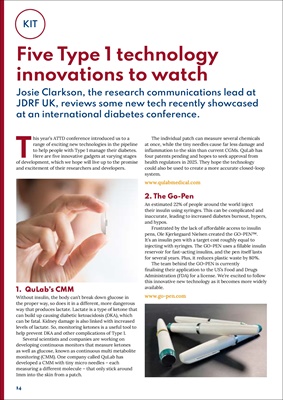
14 KIT
Five Type 1 technology
innovations to watch
Josie Clarkson, the research communications lead at
JDRF UK, reviews some new tech recently showcased
at an international diabetes conference.
This year's ATTD conference introduced us to a
range of exciting new technologies in the pipeline
to help people with Type 1 manage their diabetes.
Here are five innovative gadgets at varying stages
of development, which we hope will live up to the promise
and excitement of their researchers and developers.
1. QuLab's CMM
Without insulin, the body can't break down glucose in
the proper way, so does it in a different, more dangerous
way that produces lactate. Lactate is a type of ketone that
can build up causing diabetic ketoacidosis (DKA), which
can be fatal. Kidney damage is also linked with increased
levels of lactate. So, monitoring ketones is a useful tool to
help prevent DKA and other complications of Type 1.
Several scientists and companies are working on
developing continuous monitors that measure ketones
as well as glucose, known as continuous multi metabolite
monitoring (CMM). One company called QuLab has
developed a CMM with tiny micro needles - each
measuring a different molecule - that only stick around
1mm into the skin from a patch.
The individual patch can measure several chemicals
at once, while the tiny needles cause far less damage and
inflammation to the skin than current CGMs. QuLab has
four patents pending and hopes to seek approval from
health regulators in 2025. They hope the technology
could also be used to create a more accurate closed-loop
system.
www.qulabmedical.com
2. The Go-Pen
An estimated 22% of people around the world inject
their insulin using syringes. This can be complicated and
inaccurate, leading to increased diabetes burnout, hypers,
and hypos.
Frustrated by the lack of affordable access to insulin
pens, Ole Kjerkegaard Nielsen created the GO-PEN™.
It's an insulin pen with a target cost roughly equal to
injecting with syringes. The GO-PEN uses a fillable insulin
reservoir for fast-acting insulins, and the pen itself lasts
for several years. Plus, it reduces plastic waste by 80%.
The team behind the GO-PEN is currently
finalising their application to the US's Food and Drugs
Administration (FDA) for a license. We're excited to follow
this innovative new technology as it becomes more widely
available.
www.go-pen.com